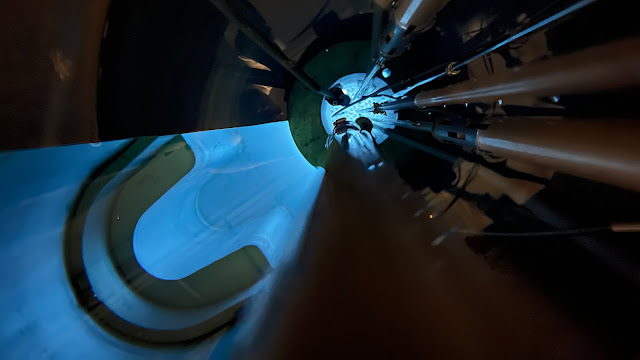AFRRI Hosts Representatives From Italy, Japan
Members of AFRRI recently met with representatives from both Italy and Japan to continue strengthening its international partnerships.
 |
The TRIGA (Training, Research, Isotopes, General Atomics) Mark-F Reactor is the centerpiece of the AFRRI facility. (Photo courtesy of AFRRI) |
April 23, 2024 by Ian Neligh
Members of the Uniformed Services University’s Armed Forces Radiobiology Research Institute (AFRRI) met separately with representatives from both Italy and Japan to continue strengthening its international partnerships recently.
AFRRI was founded in 1961 to perform scientific research in the field of radiobiology to “preserve the health and performance of U.S. military personnel and to protect humankind through research that advances understanding of the effects of ionizing radiation.”
Today, its mission is preserving and protecting the health and performance of U.S. military personnel that operate in “radiologically contaminated multi-domain conventional or hybrid battle spaces,” as well as urban environments. Through research, education, and operational training, AFRRI works to advance the understanding of the effects of ionizing radiation.
Created during the height of the Cold War, the institute remains the U.S. Department of Defense’s only radiobiology facility dedicated to researching adverse medical effects of radiation, thereby supporting nuclear and radiological defense.
Dr. Florigio Lista, director of Italy’s Defense Institute for Biomedical Sciences, met with AFRRI leaders on Feb. 6 to discuss potential collaborations in bioinformatics and proteomics.
.jpg) |
Members of Japan's National Defense Medical College (NDMC) visited AFRRI to discuss potential collaborations, medical countermeasures, and radiation combined injury. (Photo courtesy of AFRRI) |
Lista’s organization is responsible for the diagnosis and surveillance of emerging and endemic infectious diseases in operational areas, molecular diagnostics for the prevention and diagnosis of human diseases, rapid diagnostics applied to microbiology, and biological emergencies of military and public health interest.
Lista spoke with AFRRI about hosting future Italian scientists for further training in advanced product development of medical countermeasures for acute radiation syndrome. This was Lista’s third visit to AFRRI since 2012.
The next day, Dr. Manabu Kinoshita and colleagues from Japan’s National Defense Medical College (NDMC) visited AFRRI to discuss potential collaborations, medical countermeasures, and radiation combined injury, marking NDMC’s third visit to the Institute since 2018.
Japan’s National Defense Medical College is a six-year university-level military academy under the control of the Ministry of Defense, whose objective is to train future military officers who are also medical doctors.
Kinoshita spoke with AFRRI about the possibility of hosting scientists for further training in radiation-combined injury and medical countermeasures.
“Given current geopolitical events, these collaborations with our international allies are as important as ever for AFRRI,” said Lt. Nicholas Hance, director for Administration at AFRRI. “They serve to establish rapport, exchange ideas, and create a plan moving forward.”




